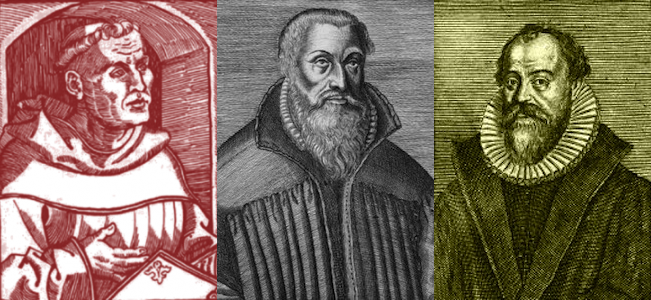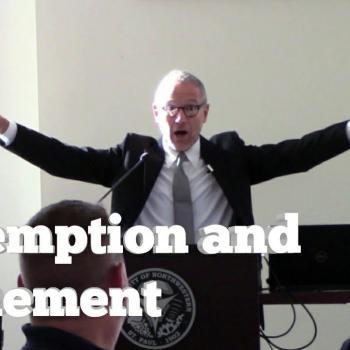There has been a fair amount of misrepresentation of Lutheranism by Lutherans in recent days and weeks — on the internet, of course, or how else could I make such a statement? Clairvoyant, I ain’t. Anyway, these misrepresentations are by no means original or unprecedented (in fact they are quite common), but they are still very much worth addressing.
I do not wish to go word for word with the misrepresenters so much as point out two things:
A) what these misrepresentations are; and
B) what our Lutheran tradition has to say which demonstrates that these are in fact misrepresentations of Lutheranism.
I use the term “misrepresentations” because it doesn’t say anything about anyone’s intentions (which I don’t know, obviously), nor does it suggest that all of these are cases of blatant falsehood. But intentional, blatant, subtle, or otherwise, they remain problematic.
Here are some summaries of the misrepresentations:
- “We don’t have free will” — Who is “we”? When? At the very least, this is too broad.
- “We don’t progress in sanctification” — Really? This would come as news to Martin Luther.
- “We shouldn’t look at/care about our works” — This is a reductionism of “You shouldn’t look to your works/your growth in holiness as evidence of your justification,” which is absolutely true. The reductionism? Not so true. Not true at all, actually.
- “We don’t need exhortation to good works” — This is often supported with the contention that we do good works spontaneously and freely, out of love, because of the Gospel. This is true. But “spontaneously” and “freely” are not the same as “automatically.” And as I will show, this isn’t how our Confessions or our principal theologians speak.
- “The Holy Spirit doesn’t indwell us” — Yes. I have seen this stated rather matter-of-factly by a popular Lutheran pastor. I will likely identify him later, as this is among the most absurd things I’ve ever seen written by an ordained Lutheran minister and it needs to be exposed. If there were actually confusion on this point among the ministerium of the LCMS, I would have to conclude that the game was over; fortunately, I do not believe this error to be widespread. In the words of a friend (also a Lutheran pastor), “This is really basic stuff.”
And, my personal favorite:
- “You’re denying the ‘simul’/that basically does away with ‘the simul’“ — This isn’t so much a misrepresentation as it is a popular ipse dixit that is brought out if you happen to disagree with any of the above positive statements. Someone is going to slap this rejoinder on the table like it’s a royal flush — I guarantee it. If you don’t believe me, this one is safe to try at home. Kind of.
I’d like to address #6 briefly, if I may, before going on:
There sees to be a popular identification of Luther’s famous phrase simul iustus et peccator, “at once just and sinner”, with the dichotomy in Ephesians 4:22-24 and Colossians 3:9-10 of Old Man/New Man. Until recently, I was not aware of just how common this was/is. “Iustus“, it is said, equals “New Man”, while “peccator” equals Old Man. Basically, it is claimed, the phrase is about the existential struggle of the Christian described by St. Paul in Romans 7. As easy as this connection may be to make, there is ample reason to believe that this identification is somewhat overwrought.
While these two dualities (at once just and sinner; Old Man/New Man) are related, they are not identical. This is crucial to recognize. The reality of us being simul iustus et peccator certainly pertains to the Old Man/New Man dichotomy, this is most certainly true. But the phrase is basically an un-existential statement about our being “reckoned righteous”, even though we remain sinners this side of the Resurrection.
In short, at its core “The Simul” is more Romans 4 than it is Romans 7. And this isn’t assertion on my part, nor is it mere conjecture: the Rev. Dr. Thomas Winger, president of Concordia Theological Seminary in St. Catharines, Ontario, traces the usage of the phrase in Lutheran theology in his excellent essay “Simul Justus Et Peccator: Did Luther and the Confessions Get Paul Right?” (presented in Dresden in 2004 and published in LTR XVII 2004-5, 90-108; available here). The first use of the phrase comes from Luther in his commentary on Romans 4. Dr. Winger writes:
The first clear use of simul justus et peccator language occurs in Luther’s early lectures on Romans (1515)—and this fact is extremely important for locating the Scriptural foundation of the idea. Surprisingly, though, it is not in his discussion of chapter seven that the phrase first occurs, but in his comments on Romans 4:7-8, which itself is a quotation of Psalm 32:1-2.
Blessed are those whose iniquities are forgiven [ἀφέθησαν; remissae], and whose sins are covered [ἐπεκαλύφθησαν]; blessed is the man against whom the Lord will not reckon [οὐ μὴ λογίσηται; non inputabit] his sin.
So far Winger. This isn’t to say that simul iustus et peccator has nothing to do with Romans 7 — of course it does. But it’s a first premise, in the same way that Romans 4 is necessarily an a priori for Romans 7. One cannot freight this phrase with everything that can possibly be said about our existential experience as justified Christians without doing injury to its primary meaning, which is very simple: take heart, for although you are a sinner, you are righteous in God’s sight. For a helpful explication of this, see here. (NB: I don’t necessarily endorse every single thing that the author of the linked piece says. I only say that because I haven’t had the time to tell if I do. Even so, it’s worth reading.)
Without further ado, here are the promised quotations from our Lutheran fathers on the matters of free will, good works, and, well…”The Simul,” I guess.
::
Blessed Martin Luther
This is the freedom and the slavery of which Paul speaks in Rom. 6:20, 22: “When you were slaves of sin, you were free in regard to righteousness. But now that you have been set free from sin, you have become slaves of God.” But let us set this up in a diagram:
Freedom from righteousness » Service of sin
Service of righteousness » Freedom from sin
For he who is free from sin has become a slave of righteousness; but he who is the slave of sin is free from righteousness, and vice versa. . . . “Christ,” he says, “has made us free with this freedom.” It is a spiritual freedom, one to be preserved in the spirit. It is not that heathen kind, which even the pagan Persius knew was not enough. It is freedom from the Law, but in a way contrary to what usually takes place among men. For it is human freedom when laws are changed without effecting any change in men, but it is Christian freedom when men are changed without changing the Law. Consequently, the same Law that was formerly hateful to the free will now becomes delightful, since love is poured into our hearts through the Holy Spirit (Rom. 5:5). In this freedom, he teaches us, we must stand strongly and steadfastly, because Christ, who fulfills the Law and overcomes sin for us, sends the spirit of love into the hearts of those who believe in Him. This makes them righteous and lovers of the Law, not because of their own works but freely because it is freely bestowed by Christ.
(Blessed Martin Luther, commentary on Galatians v. [1519]; Luther’s Works, vol. 27, ed. Jaroslav Pelikan; CPH: St. Louis, 1964, 1992; pp. 325-326)
:: :: ::
And when I exhort to walk in the Spirit, that you fulfill not the concupiscence of the flesh, I do not require of you that you should utterly put off the flesh or kill it, but that you should bridle and subdue it. For God will have mankind to endure even to the last day. And this cannot be done without parents, which do beget and bring up children. These means continuing, it must needs be that flesh also must continue, and consequently sin, for flesh is not without sin. Therefore in respect of the flesh we are sinner: but in respect of the Spirit we are righteous, and so we are partly sinners and partly righteous. Notwithstanding our righteousness is much more plentiful than our sin, because the holiness and righteousness of Christ our Mediator doth far exceed the sin of the whole world, and the forgiveness of sins which we have through Him is so great, so large, and so infinite, that it easily swalloweth up all sins, so that we walk according to the Spirit, &c.
(A Commentary on St. Paul’s Epistle to the Galatians By Martin Luther, eds. Johann Friedrich Wilhelm Tischer, Samuel Simon Schmucker; Philadelphia, Smith, English & Co.: 1860; p. 571)
:: :: ::
That is what my Antinomians, too, are doing today, who are preaching beautifully and (as I cannot but think) with real sincerity about Christ’s grace, about the forgiveness of sin and whatever else can be said about the doctrine of redemption. But they flee as if it were the very devil the consequence that they should tell the people about the third article, of sanctification, that is, of new life in Christ. They think one should not frighten or trouble the people, but rather always preach comfortingly about grace and the forgiveness of sins in Christ, and under no circumstance use these or similar words: “Listen! You want to be a Christian and at the same time remain an adulterer, a whoremonger, a drunken swine, arrogant, covetous, a usurer, envious, vindictive, malicious, etc.!” Instead they say, “Listen! Though you are an adulterer, a whoremonger, a miser, or other kind of sinner, if you but believe, you are saved, and you need not fear the Law. Christ has fulfilled it all!…They may be fine Easter preachers, but they are very poor Pentecost preachers, for they do not preach… “about the sanctification by the Holy Spirit,” but solely about the redemption of Jesus Christ, although Christ (Whom they extol so highly, and rightly so) is Christ, that is, He has purchased redemption from sin and death so that the Holy Spirit might transform us out of the Old Adam into New Men…Christ did not earn only gratia, grace, for us, but also donum, “the gift of the Holy Spirit,” so that we might have not only forgiveness of, but also cessation of, sin. Now he who does not abstain from sin, but persists in his evil life, must have a different Christ — that of the Antinomians; the real Christ is not there, even if all the angels would cry, “Christ! Christ!” He must be damned with this, his new Christ.
(On the Council and the Church, Luther’s Works, ed. Jaroslav Pelikan; CPH: St. Louis, 1964, 1992; 41:113-114).
The Apology of the Augsburg Confession
[I]n our churches all the sermons are occupied with such topics as these: of repentance; of the fear of God; of faith in Christ, of the righteousness of faith, of the consolation of consciences by faith, of the exercises of faith; of prayer, what its nature should be, and that we should be fully confident that it is efficacious, that it is heard; of the cross; of the authority of magistrates and all civil ordinances [likewise, how each one in his station should live in a Christian manner, and, out of obedience to the command of the Lord God, should conduct himself in reference to every worldly ordinance and law]; of the distinction between the kingdom of Christ, or the spiritual kingdom, and political affairs; of marriage; of the education and instruction of children; of chastity; of all the offices of love. From this condition of the churches it may be judged that we diligently maintain church discipline and godly ceremonies and good church-customs. (Apology, Article XV [VIII], 43-44)
The Formula of Concord, Solid Declaration
Doctor Luther says (regarding Ps. 90):
In worldly and external affairs; which pertain to the livelihood and maintenance of the body, man is cunning, intelligent, and quite active; but in spiritual and divine things, which pertain to the salvation of the soul, man is like a pillar of salt, like Lot’s wife, yea, like a log and a stone, like a lifeless statue, which uses neither eyes nor mouth, neither sense nor heart. For man neither sees nor perceives the terrible and fierce wrath of God on account of sin and death [resulting from it], but ever continues in his security, even knowingly and willingly, and thereby falls into a thousand dangers, and finally into eternal death and damnation; and no prayers, no supplications, no admonitions, yea, also no threats, no chiding, are of any avail, yea, all teaching and preaching is lost upon him, until he is enlightened, converted, and regenerated by the Holy Ghost, for which [renewal of the Holy Ghost], indeed, no stone or block, but man alone, was created. And although God, according to His just, strict sentence, has utterly cast away the fallen evil spirits forever, He has nevertheless, out of special, pure mercy, willed that poor fallen human nature might again become and be capable and participant of conversion, the grace of God and eternal life; not from its own natural, active [or effective] skill, aptness, or capacity (for the nature of man is stubbornly hostile against God), but from pure grace, through the gracious efficacious working of the Holy Ghost.
And this Dr. Luther calls capacitatem, capacity, non activam, not active, which he explains thus: Quando patres liberum arbitrium defendunt; that is:
When the Fathers defend the free will, they are speaking of this, that it is capable of freedom in this sense, that by God’s grace it can be converted to good, and become truly free, for which it was created in the beginning. [Tom. 1:236/WA 2:647]; to like effect also Augustine has written, lib. 2, Contra Iulianum. Doctor Luther on Hosea 6; also in the Church-Postil on the Epistle for Christmas; also on the Gospel for the third Sunday after Epiphany. (SD FC II.20-23)
:: :: ::
[T]here is a great difference between baptized and unbaptized men. For since, according to the doctrine of St. Paul, Gal. 3:27, all who have been baptized have put on Christ, and thus are truly regenerate, they have now arbitrium liberatum (a liberated will), that is, as Christ says, they have been made free again (Jn. 8:36); whence they are able not only to hear the Word, but also to assent to it and accept it, although in great weakness.
For since we receive in this life only the first-fruits of the Spirit, and the new birth is not complete, but only begun in us, the combat and struggle of the flesh against the spirit remains even in the elect and truly regenerate men; for there is a great difference perceptible among Christians not only in this, that one is weak and another strong in the spirit, but each Christian, moreover, experiences in himself that at one time he is joyful in spirit, and at another fearful and alarmed; at one time ardent in love, strong in faith and hope, and at another cold and weak. (FC SD II.67-68)
Blessed Martin Chemnitz*
*whom I consider to be the greatest Lutheran theologian ever to have lived
This teaching is set forth in our churches plainly and distinctly from the Word of God, namely, that the expiation of sins, or the propitiation for sins, must not be attributed to the merits of our works. For these things are part of the office which belongs to Christ the Mediator alone. Thus the remission of sins, reconciliation with God, adoption, salvation, and eternal life do not depend on our merits but are granted freely for the sake of the merit and obedience of the Son of God and are accepted by faith. Afterward, however, the good works in the reconciled, since they are acceptable through faith for the sake of the Mediator, have spiritual and bodily rewards in this life and after this life; they have these rewards through the gratuitous divine promise; not that God owes this because of the perfection and worthiness of our works, but because He, out of fatherly mercy and liberality, for the sake of Christ, has promised that He would honor with rewards the obedience of His children in this life, even though it is only begun and is weak, imperfect, and unclean. These promises should arouse in the regenerate a zeal for doing good works. For from this we understand how pleasing to the heavenly Father is that obedience of His children which they begin under the leading of the Holy Spirit in this life, while they are under this corruptible burden of the flesh, that He wants to adorn it out of grace and mercy for His Son’s sake with spiritual and temporal rewards which it does not merit by its own worthiness. And in this sense also our own people do not shrink back from the word “merit,” as it was used also by the fathers. For the rewards are promised by grace and mercy; nevertheless, they are not given to the idle or to those who do evil but to those who labor in the vineyard of the Lord. And so the word “merit” is used in the Apology of the Augsburg Confession, the Württemberg Confession, and in other writings of our men. In this way and in this sense, we set forth the statements of Scripture in our churches about the rewards of good works:
1 Tim. 4:8: “Godliness is of value in every way, as it holds promise for the present life and also for the life to come.”
Luke 14:14: “You will be repaid at the resurrection of the just.”
Matt. 5:12: “Your reward is great in heaven.”
Matt. 10:42: “He shall not lose his reward.”
Gal. 6:9: “Let us not grow weary in well-doing, for in due season we shall reap, if we do not lose heart.”
Eph. 6:8: “Knowing that whatever good any one does, he will receive the same again from the Lord.”
Heb. 6:10: “God is not so unjust as to overlook your work and the love which you showed for His sake in serving the saints.”
2 Thess. 1:6–7: “Since indeed God deems it just to repay with affliction those who afflict you and to grant rest with us to you who are afflicted, etc.”
Scripture is full of such promises of spiritual and bodily rewards. (Examen Concilium Tridentini [1:653ff])
Blessed Johann Gerhard
(II) Neither does the question concern the state of the reborn and renewed person: as to how the powers of free choice have been established in him, for we confess that the person who has been reborn and renewed through the Holy Spirit has free will toward spiritual good, in fact, a will freed from slavery to sin by the power of the Holy Spirit. Yet in this life this freedom is far from the perfect freedom of the life to come, as shall be explained in greater detail a little later. (Waiting on a citation from the translator)
That’s all, folks. I might continue to amend this list as continue my research.
+SDG+












